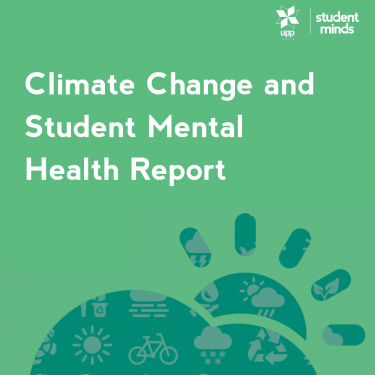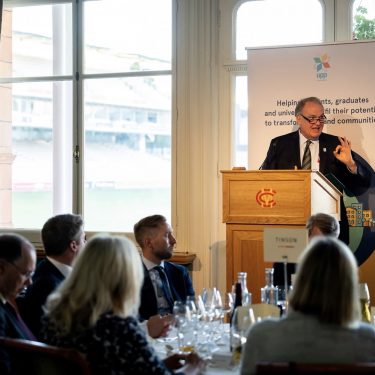Leading higher education charity to fund new pilot initiatives with universities and charities
The UPP Foundation, the registered charity founded by student accommodation and infrastructure business UPP, has invested over £160,000 in grant funding for eight innovative pilot projects with charities and universities.
The projects were selected by the Foundation’s Trustees following the submission of over 50 applications during the latest funding round – the most the Foundation has received to date.
Funding was awarded to schemes which support student and graduate success for disadvantaged and underrepresented groups, and for initiatives which support universities’ efforts to embed environmental sustainability within their local communities.
The UPP Foundation has awarded grants to:
- Establish a tutoring scheme for undergraduates to tutor local year 8 pupils in literacy (University of Exeter)
- Create an Energy Advice Centre where students will support the local community to save on their energy bills (London South Bank University)
- Research the relationship between climate change and student mental health (Student Minds)
- Support the transition from school to university for low-income students (projects from the Brilliant Club and Villiers Park Educational Trust)
- Develop an application which will map and protect local biodiversity (University of Lincoln)
- Incubate student engagement in local sustainability projects which support employability skills for participating students (Yorkshire Universities)
- Capture the experiences of international students in the UK jobs market (AGCAS)
The eight pilot projects were chosen on the basis of their overall quality, synergy with the UPP Foundation’s goals, commitment to partnership, innovative approach and potential for impact.
The outcomes of the pilots will be shared across higher education so that best practice can be embedded across the sector.
Commenting on the successful applications, Richard Brabner, Director of the UPP Foundation said:
“We received an unprecedented number of outstanding applications for our most recent funding round. We chose these brilliant projects as they help universities address fundamental issues we are facing in society, and provide an innovative approach to supporting disadvantaged students succeed during their studies
“We expect that these projects will ignite great practice across the higher education sector and look forward to sharing their outcomes in the months and years ahead.”
ENDS:
1. 2023 Grants
Tutoring Pilot – University of Exeter (£24,885):
Social mobility researchers led by Lee Elliot Major, will work with the University’s access team to look at different models of tutoring and develop a discrete tutoring course in foundational literacy for year 8 pupils. They will then train 100 undergraduates to deliver small-group tutoring to 300 local pupils. At the conclusion of the project Exeter will publish a set of recommendations and guidance for universities and policy makers indicating potential models through which universities across the country can deliver student tutoring.
Energy Advice Centre – South Bank University (£23,548):
Legal Advice Centres, where students provide free guidance to local residents on their legal rights, are common across the sector. South Bank have taken this idea and will be piloting a similar approach for energy. South Bank will establish an advice centre for their local community, focussed on ways that households can reduce their energy consumption, improve energy efficiency, and save money as the cost-of-living crisis starts to bite. This will be run by undergraduates and overseen by PhD students, with weekly clinics hosted over the course of the year.
Climate Change and Student Mental Health Report – Student Minds (£10,544):
Leading student mental health charity Student Minds have been awarded a grant to run a research project looking at the links between mental health and climate change amongst the student body. Research will be based on qualitative and quantitative approaches, with a report published with conclusions and recommendations towards the end of the year.
Join the Dots – Brilliant Club (£25,000) & Transition to Success – Villiers Park Educational Trust (£25,000)
Better supporting the transition to higher education from school or college emerged as one of the key themes from the UPP Foundation’s Student Futures Commission as a way to enable student success, continuation and graduate outcomes. As part of this funding-round the UPP Foundation is supporting two pilot projects on this theme with two leading access charities. At the end of the pilots, the Foundation will then produce a report sharing learnings from these distinct approaches to enable best practice to flourish in the sector.
Brilliant Club
Students from disadvantaged backgrounds will be matched with a PhD Coach from the university they are attending. Each PhD Coach will support a group of eight students through a six-month transition programme (pre-entry to end of the first term). The programme also includes a community element, as they will be connecting students from similar backgrounds through facilitated peer groups where they will be encouraged to reflect on their experiences and support each other through the transition. Join the Dots will be supporting 50-100 students in the pilot phase.
Villiers Park Educational Trust
This project will support 500 students at participating universities. Using ‘solution-focussed’ coaching, the course aims to equip incoming students with the self-reflection, thinking skills and confidence to prepare for and manage the practical, emotional, and logistical aspects of negotiating social, academic, and domestic change. It will run over 6 months from June (before entry) to the end of the calendar year.
App for biodiversity – University of Lincoln (£24,997):
There is a need to understand and enhance ecosystem provision (biodiversity and carbon storage) in urban areas. Urban centres are also the areas which are most at risk of decline. This project aims to support the local community to better understand the key biodiversity provided locally, and how to take action to enhance it. To achieve this, Lincoln will engage with local communities and, using a citizen science approach, map three key ecosystem areas in Lincoln using an AI-enabled mobile application that measures i) biodiversity and habitat connectivity; ii) above-ground vegetation carbon storage and iii) Water infiltration for flood regulation. The aim is to support the local community understand biodiversity in the city and then support its protection and enhancement.
Sustainability Service-Learning Pilots – Yorkshire Universities (£20,000):
Service-learning is where students use the knowledge and skills they have acquired within their degree to support a project or organisation delivering positive social change locally – students often receive credits towards their degree from the service-learning modules. This project funds Yorkshire Universities to audit existing work within their twelve members, scope out a brokerage network between communities and universities, as well as fund mini challenges, collate and share an online repository of pilot projects to showcase to a wider audience. The focus for the service-learning initiatives will be on local environmental and sustainability projects.
International graduates and UK employment: capturing experiences of post-study work visas – AGCAS (£12,400):
AGCAS is the membership organisation for higher education student career development and graduate employment professionals. Its project aims to enhance support for international students by raising awareness of the facilitators and barriers to success in the UK job market. Drawing on international graduates’ experiences of seeking and gaining employment in the UK – through surveys, focus groups and case studies – they will assess the effectiveness of the Graduate Route and other post-study visas and outline how the sector can better support international students considering UK graduate employment.
2. Quotes from grant recipients
Professor Lisa Roberts, Vice Chancellor and Chief Executive of the University of Exeter, said:
“We are delighted to be working with the UPP Foundation on this exciting project – this will provide our undergraduates with opportunities to make a positive impact on our communities, and help deliver on the university’s aims to contribute to social justice.”
Lee Elliot Major, Professor of Social Mobility at the University of Exeter, said:
“We believe a university-led tutoring service could be an education game-changer: enabling undergraduates to develop life skills as tutors and boosting the school achievement of poorer pupils across the country. This has real promise to develop into a nation-wide programme helping to level-up educational opportunities.”
Professor David Phoenix, Vice-Chancellor of London South Bank University (LSBU) said:
“Rising energy bills are hitting people hard and our new LSBU Energy Advice Centre will provide a vital service to thousands of Londoners by offering advice and information online and in face-to-face to help people cut their fuel bills. We are incredibly grateful to the UPP Foundation for their kind donation which has enabled us to launch and run the LSBU Energy Advice Centre. Our student-led advice service will help people to save money on their energy costs and is one of many examples of LSBU students gaining applying their learning to gain experience whilst providing support to people living in the communities where we are based.”
Professor Benjamin Lishman, Associate Dean and project lead for London South Bank’s Energy Advice Centre said:
“We’re excited to work with UPP Foundation to develop the LSBU Energy Advice Centre. It gives our students the chance to do practical work in the community, and to interact with members of the public to solve real problems. Many people are facing challenges this winter and I’ve been delighted with the way our students have stepped up. We’ve got a fantastic team and I think the enthusiasm of our students is one of our real strengths. We’re already looking at ways we can expand our remit, for example by supporting local businesses as well as individuals. We hope this centre can become a useful model for engineering students across the country.”
Rosie Tressler OBE, Chief Executive Officer of Student Minds said:
“The climate emergency demands an urgent response, so we are delighted to be conducting this timely research, which centres student experiences. Our goal is to provide a strong foundation for future exploration into the relationship between climate change and student mental health. We are delighted to partner once again with the UPP Foundation to deliver this work. We hope the report will serve as a vital resource for all future researchers, policymakers, activists and professionals interested in tackling two of the biggest challenges facing our society today.”
Susie Whigham, Interim CEO of The Brilliant Club said:
“We are thrilled to be partnering with the UPP Foundation on piloting and evaluating our Join the Dots programme. Join the Dots supports less advantaged students as they transition from school and settle into university life. UPP Foundation shares our vision to foster a positive student experience so that we can see more students from disadvantaged backgrounds continue into the second year of their studies and ultimately achieve strong degree outcomes.”
Gaby Sumner, Chief Executive of Villiers Park Educational Trust said:
“I’m delighted that the UPP Foundation has agreed generous funding to develop a new project that prepares students from underrepresented backgrounds for the challenges and new experiences as they enter their first year of university.
“Through our work with our Future Leaders Programme, we know that having the right support in place for that first year of university life can be make or break for some young people.
“We are looking forward to working with the UPP Foundation and our university partners to achieve the best possible transition for students going into higher education and preparing them for successful engagement throughout their time at university.”
Pro-Vice Chancellor, Professor Libby John, Head of College of Science and Engineering and Chair of the Environmental Sustainability Committee of the University of Lincoln said:
“We welcome this opportunity to work with UPP Foundation to develop and share an innovative web-based application that will help to map biodiversity across Lincolnshire, while engaging local communities to be part of the solution to the ecological crisis and supporting them to take steps to improve biodiversity in their local area. This project will be delivered by University of Lincoln students from disciplines including Computer Science, Geography, Life Sciences and Business, providing valuable work experience”
Monika Antal, Assistant Director of Yorkshire Universities said:
“I am delighted that Yorkshire Universities will be working with the UPP Foundation on our sustainability service-learning project. This funding will enable us to pilot a unique regional collaboration between higher education institutions and local employers, across Yorkshire & Humber, and showcase the innovative ways in which students can work with local employers to support businesses in becoming more environmentally sustainable.”
Florence Reedy, Policy and Research Manager AGCAS, Helen Atkinson and Jim Campbell, AGCAS Internationalisation Task Group
“We are delighted to be receiving this generous funding from UPP Foundation to allow us to share the experiences of international graduates seeking UK employment. In spring 2022, AGCAS and its Internationalisation Task Group surveyed international graduates to learn more about their experiences of seeking employment in the UK following the introduction of the Graduate Route visa. The aim of this research project was to better understand the facilitators and barriers to success.
This backing from the UPP Foundation will provide the resource necessary to undertake further extensive analysis of survey responses, capture further qualitative data from a series of focus groups and develop a bank of case studies of international graduates. All these extended research outputs will be widely shared across the sector to help build a clearer picture of the effectiveness of the Graduate Route visa and support positive change for international graduates.”








